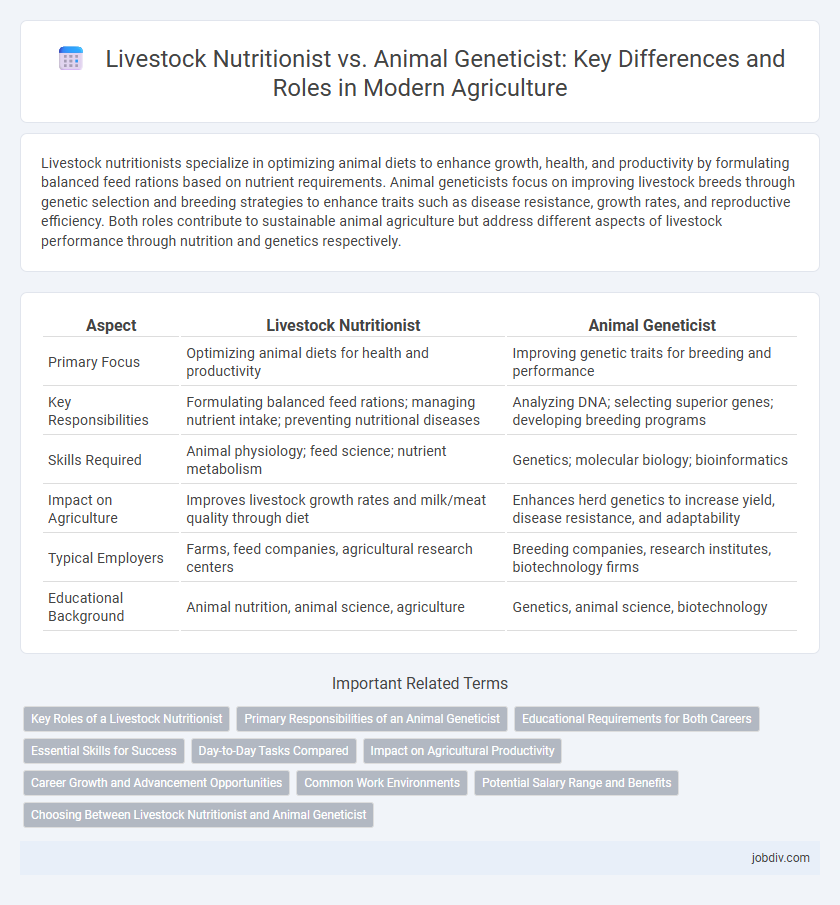Livestock nutritionists specialize in optimizing animal diets to enhance growth, health, and productivity by formulating balanced feed rations based on nutrient requirements. Animal geneticists focus on improving livestock breeds through genetic selection and breeding strategies to enhance traits such as disease resistance, growth rates, and reproductive efficiency. Both roles contribute to sustainable animal agriculture but address different aspects of livestock performance through nutrition and genetics respectively.
Table of Comparison
| Aspect | Livestock Nutritionist | Animal Geneticist |
|---|---|---|
| Primary Focus | Optimizing animal diets for health and productivity | Improving genetic traits for breeding and performance |
| Key Responsibilities | Formulating balanced feed rations; managing nutrient intake; preventing nutritional diseases | Analyzing DNA; selecting superior genes; developing breeding programs |
| Skills Required | Animal physiology; feed science; nutrient metabolism | Genetics; molecular biology; bioinformatics |
| Impact on Agriculture | Improves livestock growth rates and milk/meat quality through diet | Enhances herd genetics to increase yield, disease resistance, and adaptability |
| Typical Employers | Farms, feed companies, agricultural research centers | Breeding companies, research institutes, biotechnology firms |
| Educational Background | Animal nutrition, animal science, agriculture | Genetics, animal science, biotechnology |
Key Roles of a Livestock Nutritionist
A Livestock Nutritionist specializes in formulating balanced diets to optimize animal health, growth, and productivity by analyzing feed ingredients, nutrient requirements, and metabolic functions. Their key roles include developing tailored feeding programs, monitoring feed efficiency, and improving nutrient utilization to enhance livestock performance and reduce production costs. Unlike an Animal Geneticist who focuses on genetic improvement and breeding strategies, Livestock Nutritionists directly impact animal well-being through precise dietary management and nutritional interventions.
Primary Responsibilities of an Animal Geneticist
An Animal Geneticist primarily focuses on studying and manipulating the genetic makeup of livestock to improve traits such as growth rate, disease resistance, and reproduction efficiency. They analyze DNA sequences and apply selective breeding techniques to enhance livestock productivity and sustainability in agricultural systems. Their work supports the development of genetically superior animals that meet the demands of modern farming and food production.
Educational Requirements for Both Careers
Livestock Nutritionists typically require a bachelor's degree in animal science, nutrition, or a related field, with many pursuing advanced degrees and certifications to specialize in nutrient management and feed formulation. Animal Geneticists often hold a bachelor's degree in genetics, animal science, or biology, but most positions demand a master's or doctoral degree focusing on genetic research, biotechnology, and breeding programs. Both careers emphasize strong foundations in biology and animal sciences, yet Animal Geneticists require more extensive education in genetic principles and laboratory techniques.
Essential Skills for Success
Livestock nutritionists excel in formulating balanced diets by understanding animal physiology and feed composition, ensuring optimal growth and productivity. Animal geneticists possess expertise in genetics, selection techniques, and breeding strategies to enhance desirable traits and improve herd quality. Both roles require strong analytical skills, attention to detail, and proficiency in data interpretation for informed decision-making in livestock management.
Day-to-Day Tasks Compared
A livestock nutritionist designs balanced diets tailored to optimize animal growth, health, and productivity by analyzing feed composition and monitoring nutrient intake on a daily basis. An animal geneticist conducts routine genetic evaluations, collects DNA samples, and analyzes heredity patterns to enhance breeding programs and improve desirable traits in livestock populations. Both roles require close collaboration with farmers but differ fundamentally in focus--nutritionists concentrate on dietary management, while geneticists specialize in genetic improvements.
Impact on Agricultural Productivity
Livestock nutritionists optimize animal diets to enhance growth rates, reproduction, and overall health, directly increasing agricultural productivity through improved feed efficiency and reduced disease incidence. Animal geneticists focus on selective breeding and genetic improvements to develop livestock with superior traits such as higher milk yield, faster weight gain, and disease resistance, driving long-term productivity gains. Both roles are critical for sustainable agriculture, with nutritionists addressing immediate nutritional needs and geneticists enabling gradual genetic advancements.
Career Growth and Advancement Opportunities
Career growth for livestock nutritionists centers on specialized knowledge in animal diets and feed efficiency, leading to roles in research, farm management, or consultancy within the agricultural sector. Animal geneticists experience advancement opportunities through genetic research innovations, biotechnology, and breeding programs, often progressing to lead scientific projects or work in corporate genetics firms. Both careers offer strong prospects, but geneticists typically access higher-level positions due to the precision and technology-driven nature of their work.
Common Work Environments
Livestock nutritionists and animal geneticists frequently collaborate in research farms and university agricultural stations to enhance animal productivity and health. Both professionals often work in controlled laboratory settings where nutrition formulations and genetic analyses are conducted to optimize livestock performance. Fieldwork on commercial farms is common for both roles, enabling direct application of nutritional plans and genetic advancements to improve breeding outcomes and animal welfare.
Potential Salary Range and Benefits
Livestock nutritionists typically earn between $50,000 and $85,000 annually, with benefits including health insurance, retirement plans, and fieldwork allowances, while animal geneticists' salaries range from $60,000 to $100,000, often supplemented with research grants, professional development, and access to cutting-edge biotechnology resources. Both careers offer opportunities for advancement in specialized roles such as feed formulation and genetic improvement programs, enhancing earning potential and job security. Employers in agricultural research institutions, universities, and private companies provide varying benefit packages that support long-term career growth in these fields.
Choosing Between Livestock Nutritionist and Animal Geneticist
Choosing between a livestock nutritionist and an animal geneticist depends on the primary goals of livestock production--whether enhancing feed efficiency and animal health or improving genetic traits for productivity and disease resistance. Livestock nutritionists specialize in formulating balanced diets to optimize growth, reproduction, and overall health, while animal geneticists focus on selective breeding and genomic technologies to enhance desirable traits. Integrating both expertise can lead to synergistic benefits, boosting both animal performance and genetic potential.
Livestock Nutritionist vs Animal Geneticist Infographic

 jobdiv.com
jobdiv.com